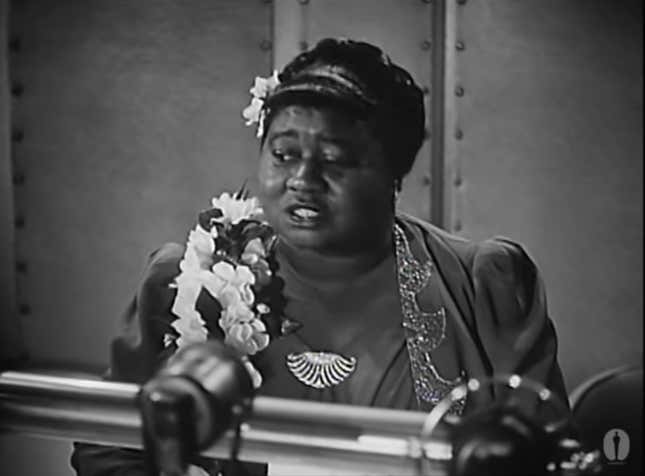
On February 29, 1940, Hattie McDaniel, arguably the most well-known black actress in the entire world at the time, took to the podium at the Cocoanut Grove nightclub inside the legendary Ambassador Hotel in Los Angeles to accept her Academy Award for Best Supporting Actress—the first ever for a black entertainer.
Adorned in a dazzling turquoise gown—her hair kissed by white gardenias—McDaniel shook presenter Fay Bainter’s hand then nodded toward the audience, their raucous applause turning into dutiful silence.
“Academy of Motion Picture Arts and Sciences, fellow members of the motion picture industry and honored guests,” she began. “This is one of the happiest moments of my life, and I want to thank each one of you who had a part in selecting me for one of the awards, for your kindness. It has made me feel very, very humble.”
She continued, “I shall always hold it as a beacon for anything that I may be able to do in the future. I sincerely hope I shall always be a credit to my race and to the motion picture industry. My heart is too full to tell you just how I feel, and may I say thank you and God bless you.”
Consumed by the magnitude of the moment, the 46-year-old actress then burst into tears as she walked past an extravagant table where her white Gone With the Wind co-stars were gathered, returning to her seat, which was elsewhere as a provision of her attendance. Because while her critically-acclaimed performance as a subservient black woman was good enough for an Oscar, explicit permission from Gone With the Wind producer David O. Selznick was required for that same black woman to accept it (the hotel adhered to a strict no-blacks policy until 1959). McDaniel would later rebuke the onslaught of criticism she bore for embracing stereotypical roles with a curt, “I’d rather play a maid than be one.”
Eighty years later, watching the latest iteration of the Academy Awards, it’s evident that very little has changed. Out of 20 acting nominees, 18 were white, and the only female directors to be found were on Natalie Portman’s cape on the red carpet.
Of equal importance is the lack of recognition and equitable opportunities for black entertainers, a point brilliantly conveyed by comedian Chris Rock during his opening salvo: “Cynthia [Erivo] did such a great job in Harriet hiding black people that the Academy got her to hide all the black nominees. Cynthia, is Eddie Murphy under this stage?”
While American Factory’s Best Documentary win solidified the Obamas as Hollywood royalty—it was produced by their newly-minted production company, Higher Ground—they weren’t nominees. This means that after somehow surviving a grueling four-hour telecast, our sole moment of black triumph came courtesy of Matthew A. Cherry and Karen Rupert Toliver winning Best Animated Short Film for Hair Love.
No, really.
And acutely aware of the film’s significance and its place in history, Cherry made it explicitly clear who his instant classic was created for.
“This film was for you,” he told The Root. “You know, all throughout the years, you know, there hasn’t been characters in...animation that look like you. This film was made for you to see yourself.”
He also recognized that his Oscar win sowed seeds that will eventually blossom into fruitful opportunities for other black creatives.
“There is space for you in animation,” he added. “And hopefully this win will help to propel the next generation of diverse people and people of color into that world.”
Which is maybe what McDaniel intended, but was unable to properly articulate—or execute.
It’s just disheartening that the Academy Awards continue to go to such great lengths to ignore our contributions to entertainment despite our standing as the epicenter of popular culture.
But since black joy can’t be denied or defined by its detractors, enjoy the taste of victory below:

